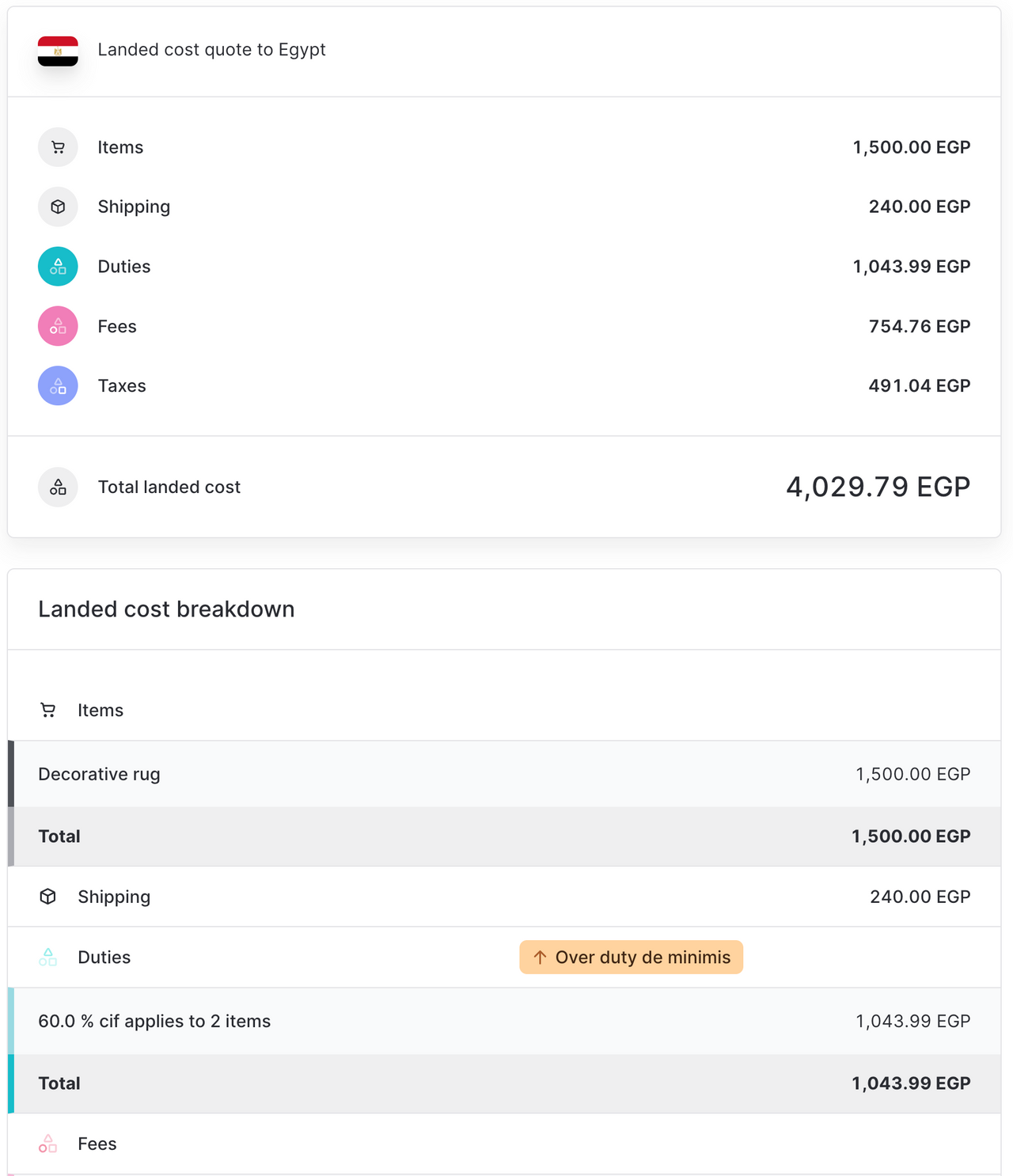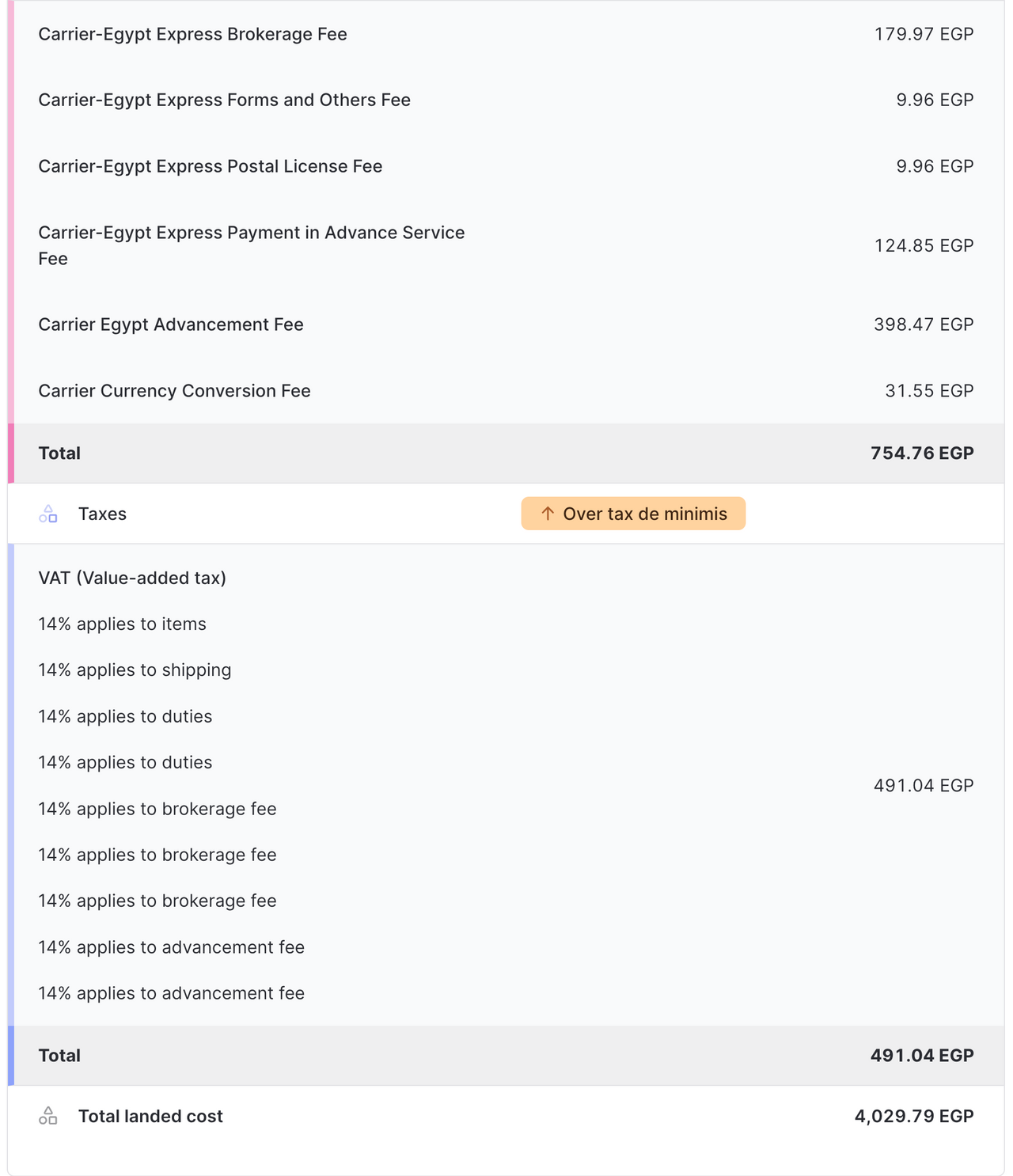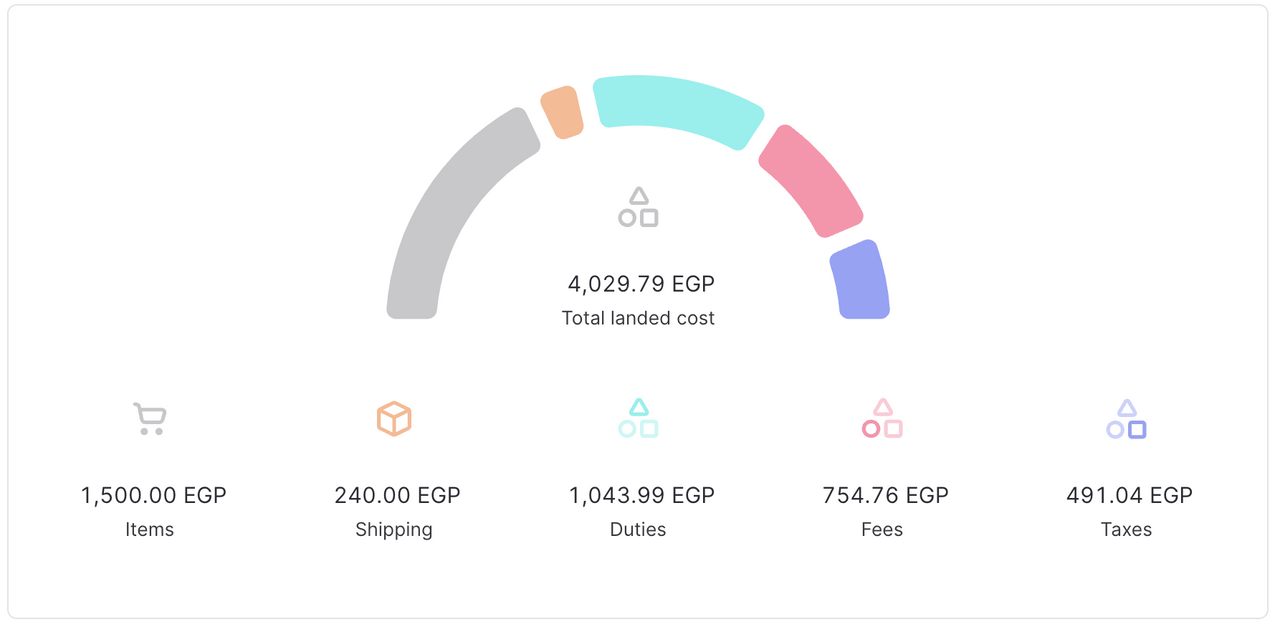Ease of importing goods score: C
Ease of doing business 2/5
- The Government of Egypt (GOE) understands that attracting foreign direct investments (FDI) is key to addressing many of the economic challenges it faces.
- Egypt has a diverse economy open to new trade opportunities.
- Egypt’s society struggles with excessive bureaucracy. Slow and cumbersome customs procedures make doing business difficult.
- Egypt also has non-tariff trade barriers, which is unattractive for trade.
Landed cost fairness 3/5
- The duty and value-added tax (VAT) rates are low, which is favorable for landed cost.
- Egypt’s de minimis is 0 EGP, so duty and tax will be charged on every import, which can result in high landed costs.
Flexibility of legal regulations 3/5
- Egypt deals with unreasonable bureaucracy.
- Egypt’s customs laws intend to drive foreign investment, simplify international trade, streamline customs, and more.
Availability and accessibility of shipping 4/5
- Most major carriers ship to Egypt, and its close proximity to the high-traffic Middle Eastern and North African (MENA) trade routes allows for easier shipping.
Accessibility and variety of payment methods 5/5
- Egypt accepts a variety of methods for online payments, such as cash, ewallets, credit cards, bank transfers, and debit cards.
Market opportunity 4/5
- Egypt’s proximity to the high-traffic that MENA provides makes for a more favorable market.
- Egypt has strong trade ties with big markets, such as the United Kingdom and the United States.
- Egypt’s has relitively high population and internet penetration, but a relatively low percentage of the population are ecommerce users.
Key stats for Egypt
| Population | 102.88 million (2022) |
| GDP | 469.09 billion USD (2022) |
| GDP per capita | 4,585.33 USD (2022) |
| Internet penetration | 71.9% of the population use the internet (2022) |
| Ecommerce users | 34% of the population shop online (2022) |
| Leading product categories | Electronics and media, fashion, food and personal care, toys, hobbies and DIYs, and furniture and appliances |
| Preferred online payment method(s) | Cash, ewallets, credit and debit cards, and bank transfers |
| Languages | Modern Standard Arabic |
| Currency | Egyptian pound/EGP/E£ |
Landed cost for Egypt
The landed cost for a cross-border transaction includes all duties, taxes, and fees associated with the purchase. This includes:
- Product price
- Shipping
- Duties
- Taxes
- Fees (currency conversion, carrier, broker, customs, or government fees)
Egyptian de minimis, tax, and duty
CIF: CIF (cost, insurance, freight) is a method for calculating import taxes or duties where the tax is calculated on the cost of the order, freight, and insurance.
Further explanation of de minimis, tax, and duty provided below
De minimis
Normally, duty and tax are only charged on imports where the CIF value of the import exceeds the minimum value threshold (de minimis). However, Egypt does not operate a de minimis, which means duty and tax fees are charged on all imports. The only time imports to Egypt are exempt from duty and tax is when they receive preferential treatment through trade agreements.
- Duty and tax de minimis: 0 EGP
Note: Applied to the CIF value of the order
Import tax
Value-added tax (VAT):
The standard VAT rate is 14%, but there is a reduced rate for certain goods. Machinery and equipment used to produce taxable or nontaxable goods or services, agricultural supplies, necessary foodstuffs, oil goods, advisory services, and the development of new properties receive a reduced VAT rate of 5%.
- Standard rate: 14%
- Reduced rate: 5%
Note: Applied to the CIF value of the order
Import duty
The average duty rate for all imports is 10.5%, but rates range from 0% to 60%.
- Average rate: 10.5%
Note: Applied to the CIF value of the order
Import fees
Other import fees
Exemptions
Goods that are exempt from customs fees:
- All medications related to infectious, chronic, psychiatric, and neurological diseases
- Medical equipment used for dialysis
- Non-processed oil, gas, and mineral resources
- Media production, including the production of films, literary, and artistic work
- Silkworm eggs
- LED bulbs and light-emitting diodes
New tariff:
- Egypt has introduced a new tariff that covers sterilized and polymer-ethylene-manufactured surgery bags. Agricultural and nutritional products have received most of the financial benefits offered by this new customs tariff.
Automotive goods fees:
- 1600 CC engine power vehicle fees were reduced by 10%, higher engine-powered vehicle fees were reduced by 35%, and electric automobiles are exempt from fees.
Custom fees on miscellaneous goods:
- Custom fees on personal care and hygiene products (e.g. toothpaste, shaving creams, medical soaps), sportswear, and protective uniforms made of cotton and synthetic fibers receive a 20% tariff. Tariffs on baby strollers were also reduced to 20%.
Unified tariff:
- A 40% customs tariff has been applied on TV screens and monitors.
Trade agreements
Egypt has at least 12 trade agreements that offer a zero or highly discounted duty rate for goods manufactured in participating countries, and many bilateral agreements with Arab countries.
Egypt is a member of the World Trade Organization
As a member of the World Trade Organization (WTO), Egypt must abide by the most-favored-nation (MFN) clause, which requires a country to provide any concessions, privileges, or immunities granted to one nation in a trade agreement to all other WTO member countries. For example, if one country reduces duties by 10% for a particular WTO country, the MFN clause states that all WTO members will receive the same 10% reduction.
Landed cost examples
Below is a sample landed cost breakdown for Egypt calculated using Zonos Quoter. Since the de minimis is 0 EGP, duty and tax will always apply:
Landed cost for a shipment to Egypt:



Customs resources
Egypt’s Customs authority:
Customs refund in Egypt:
Note: Talk to your carrier about customs refunds.
Shipping and compliance
Top courier services:
- DHL Express
- FedEx
- UPS
- USPS
- SMSA Express
- Bosta
Courier fees
Depending on the courier, additional shipping fees may include:
- Tracking
- Insurance
- Fuel surcharge
- Remote delivery charge
- Signature fee
- Overweight or oversized fee
- Special handling fee
- Dangerous goods fee
- etc.
Documentation and paperwork
- Bill of lading or air waybill
- Commercial invoice
- Certificate of Origin
- Packing list
- Pro Forma invoice
- Letter of credit
Prohibited, restricted, and controlled imports into Egypt
Government agencies regulate imports.
Restricted items are different from prohibited items. Prohibited items are not allowed to be imported into a country at all. Restricted items are not allowed to be imported into a country unless the importer has approval or a special license. Controlled goods have military or national security significance.
Prohibited items:
- Antiques
- Electronic cigarettes, shisha (vaporizer), and its components
- Smartwatches (with a camera or mobile phone)
- Viagra
- Used medical devices, open medicine, or instruments
- Honey
- Ivory
- Remote-controlled devices (wireless electronic toys and parts)
- Quantum pendant (necklace pendant)
- Pornographic CDs and sexual items/toys
- Global positioning system (GPS) devices (for personal use)
- Magic Jack & Router Varnish (USB devices that make free international calls from a computer)
- Any item offensive to the Muslim culture
- Individual/personal shipments valued above 2,000 USD.
- And more
Restricted items
- Alcoholic beverages
- Articles of high/unusual value
- Furs
- Gold or other precious metals
- Perishables
- Personal effects
- Plants
- Seeds
- Tobacco
Note: Contact your carrier for more information.
Legal regulations for businesses
New single-window system
Egypt’s Ministry of Finance issued a decree in 2021 on pre-shipment registration under a new single-window system. The decree is only applicable for business-to-business (B2B) shipments that are over 50 kilos and above $2,000 USD. It requires that B2B import documentation for Egyptian agencies at ports of entry be submitted through this new single-window system (called “Nafeza” – the Arabic word for window) 48 hours prior to shipment arrival. This process became obligatory on October 1, 2021. This system requires importers to submit all necessary shipping documentation and transaction data (customs duties, import controls, port of entry, etc.) via the online “e-portal” in order to facilitate the release of the importers’ goods from ports in Egypt.
The Egyptian importer of an inbound package must sign into the online e-portal and submit the required shipping documents. Upon successful submission, the importer will be issued an Advanced Cargo Information identification number (ACID). Either the Egyptian importer or a customs broker acting on behalf of the importer may access the online e-portal to request the issuance of the ACID number for a particular shipment. Exporters should work closely with their clients in Egypt to ensure their consignments comply with import requirements.
Particular labeling, packaging, and processing
Finished goods imported for distribution and sale in Egypt must be labeled in Arabic with the country of origin, the manufacturer’s name, and the product description. Specific additional requirements apply to foods, drugs, and textiles. Importers are no longer permitted to fix or make corrections to the printed labels on products after import.
Imported food has a number of labeling and packaging requirements. Certain foods and goods require specific labeling, packaging, and/or processing.
Tips for exporting from Egypt
The Egyptian Customs website provides an Export’s Support Unit page.
Frequently asked questions
What are the most popular online stores in Egypt?
Some of the most popular online stores in Egypt are as follows: OLX.com.eg, btech.com, Jumia.com.eg
Egypt country guide
Learn about cross-border ecommerce, shipping, and importing.
If you are looking to grow your ecommerce business into Egypt, you’ve come to the right place. Keep reading to learn everything you need to know about selling goods into Egypt.
Egypt, you’ve come to the right place. Keep reading to learn everything you need to know about selling goods into Egypt.